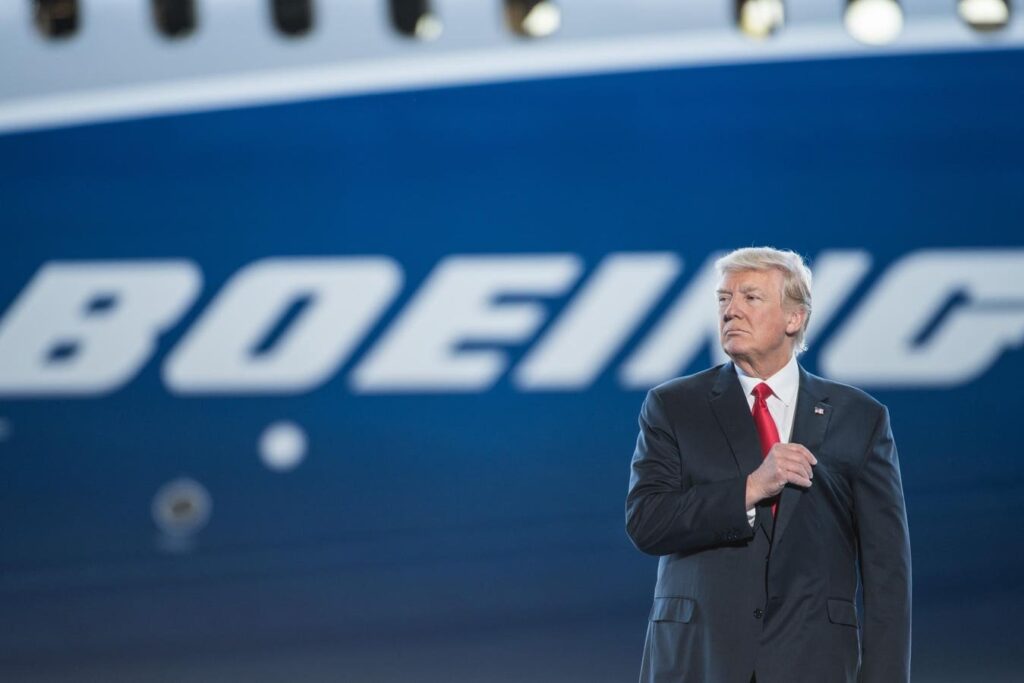Boeing has been making steady progress toward righting its commercial airliner business under new CEO Kelly Ortberg. The spectacular collapse of the relationship between President Donald Trump and his former first buddy Elon Musk could provide a lift for its struggling space division.
Amid a shocking exchange of angry statements on social media Thursday, Trump threatened to cancel federal contracts with Musk’s companies. The world’s richest man responded by asserting that his rocket and satellite company, SpaceX, would “begin decommissioning its Dragon spacecraft immediately.”
Though Musk later backed off from the threat, the blowup could have a payoff for Boeing in three areas: its struggling Starliner crew capsule program; the embattled Artemis moon landing program, for which Boeing produces giant rockets; and potentially United Launch Alliance, its rocket joint venture with Lockheed Martin.
It’s unlikely that Trump would follow through on his threat to cancel contracts – that would provide rich grounds for legal challenges, said Todd Harrison, a space and defense analyst at the American Enterprise Institute. But there’s plenty of room for the administration to direct new business to Boeing and others – and potentially pull back from the support Trump promised in his inaugural address for Musk’s ambition to reach Mars. “Where Trump can single handedly harm SpaceX in a significant way is redirecting the mission goals for NASA,” Harrison said.
SPACE TAXI
NASA contracted Boeing and SpaceX in 2014 to develop spacecraft to fly U.S. astronauts to the International Space Station on a commercial basis rather than owning and operating the vehicles itself. But Boeing has suffered a series of embarrassing setbacks with Starliner, leaving NASA dependent on SpaceX’s Dragon. The agency has since added three more launches to SpaceX’s contract, for a total of nine.
Boeing has lost $2 billion on its $4.6 billion, fixed-price contract.
There have been questions over Starliner’s future following its troubled first crewed test flight to the ISS last year. Though it transported astronauts Suni Williams and Butch Wilmore successfully to the ISS, thruster malfunctions led NASA to decide it was too risky for them to return to Earth on Starliner. The astronauts were forced to wait aboard the space station for nine months for a Dragon capsule to arrive to take them back.
Musk’s threat to retire Dragon could change the calculus for the administration.
“I think NASA may feel that having alternatives would be wise,” said Tim Farrar, an independent satellite industry consultant.
A wildcard: Russia hasn’t committed to supporting the ISS beyond 2028. If Russia withdraws, it could force NASA to deorbit the station earlier than the end of 2030, as planned, reducing the need for transport services.
TO THE MOON
In its 2026 budget request, the Trump administration proposed a radical overhaul of the Artemis program, begun during the president’s first term to return Americans to the moon. The administration wants to phase out the giant Boeing-produced rocket at the heart of the program, the Space Launch System, after two more launches. Nicknamed the “Senate Launch System” for the pork the program provides, a single launch costs a steep $4 billion. The budget request proposed transitioning to cheaper commercial systems – with the chief candidates expected to provide them being SpaceX and Blue Origin.
But it hasn’t been clear that Congress would go along with cutting SLS, which supports jobs in all 50 states. The Senate Commerce committee reportedly is considering restoring $4 billion cut from NASA’s budget for SLS, and the Trump administration may not be inclined to fight them.
“It seems more likely now that NASA may continue with an Artemis program that utilizes SLS,” said Harrison.
One other potential winner besides Boeing: Blue Origin. NASA has contracted the Jeff Bezos-owned company and SpaceX to both produce lunar landers for the Artemis program. With three successive failed flight tests for SpaceX’s massive Starship rocket, which is needed to transport the company’s lander, NASA could well decide to double down with Blue Origin.
NATIONAL SECURITY
The blowup could lead the Department of Defense and other national security agencies to redouble their efforts to diversify their stable of satellite launch providers, which is dominated by SpaceX. But the immediate upside could be limited for ULA, Boeing and Lockheed’s launch company, which needs to scale up the launch rate of its new Vulcan heavy rocket. “ULA couldn’t take all of SpaceX’s contracts, even if they were handed to them,” Harrison explained
The toxic breakup with Musk could also lead defense officials to reconsider how much they would want to rely on SpaceX for Golden Dome, the administration’s plan to create a missile defense shield for the United States.
“This might give people pause when thinking about whether that money should go to Musk or to more traditional contractors,” said Farrar. Like, say, Boeing.
Read the full article here

















